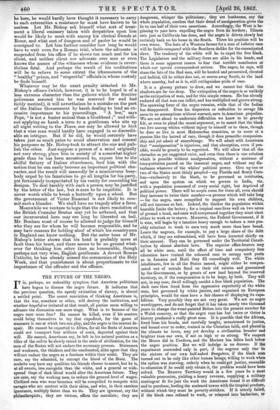THE FUTURE OF THE NEGRO.
IT is, perhaps, no unhealthy symptom that American politicians have begun to discuss the negro future. It indicates that the previous question, the speedy extinction of slavery, is almost a settled point. The secret conviction of thinking Americans is, that the war, somehow or other, will destroy the institution, and whether hopeful or irritated at that result, all parties seem willing to advance the discussion one more stage. What is to become of the negro once more free? He cannot be killed, even if his masters could bring themselves to try that expedient, for the game of nmasanre is one at which two can play, and the negro is the nearest de- spair. He cannot be exported to Africa, for all the fleets of America could not transport four millions of souls, deported against their will. He cannot, Americans say, be left in his natural position as a tiller of the soil to be slowly raised in the scale of civilization, for the men of the States will not endure the necessary process. Statesmen and workmen, the thinkers and the uneducated, alike agree that they will not endure the negro as a freeinan within their midst. They are sure, say the educated, to corrupt the blood of the State. The mulatto may have any qualities his friends choose to assert, but he is, at all events, less energetic than the white, and a general or wide- spread tinge of dark blood would alter the American future. They are sure, say the working men, to reduce the general level of wages. Civilized men who wear breeches will be compelled to compete with savages who are content with their skins, and who, in their careless ignorance, multiply faster than we do. They are ignorant, cry the philanthropists; they are vicious, affirm the moralists; they are dangerous, whipper the politicians ; they are loathsome, say the whole population, careless that their dread of amalgamation gives the lie to one half of their own assertions. Accordingly, the West is be- ginning to pass laws expelling the negro from its borders; Illinois acts just as California has done, and the negro is driven slowly but certainly back on his home in the South. There his position will be even worse. The hate of a Western farmer fora man of inferior race will be feeble compared with the Southern dislike for the emancipated slave. The tendency of the white will be to expel the free black. The Legislature and the military force are alike in his hands, and there is some apparent reason to fear that terrible conclusion at which our special correspondent arrives. The negro, he says, will share the fate of the Red man, will be hunted and persecuted, cheated and bullied, till he either dies out, or moves away South, to the land where anarchy, bad as it is, still extinguishes pride of race.
It is a gloomy picture to draw, and we cannot but think the shadows are far too deep. The extirpation of the negro is as unlikely as the extirpation of man, and for this simple reason. He has already endured all that man can inflict, and has multiplied and grown strong. The spawning force of the negro remains, while that of the Indian has disappeared. Even his dispersion or reduction to savage life seem to us assumptions without warrant, save in American prejudice. We are not about to underrate difficulties we know to be gravely felt, or even to plead the moral argument, or to assert that the black can live amonc, whites without injury to himself or to them, though he does so eve in most Mahomedan countries, or to sneer at a passion like the hatred of race, though it does proscribe companion- ship and yet admit of coneubinage. We will admit with Americans that "amalgamation" is injurious, and that absorption, even if pos- sible, would be greatly to be regretted. We will allow that all the obstacles as yet suggested exist, and even then there is one solution which is possible without amalgamation, without a sentence of transportation passed on the innocent negro, and without any dis- turbance whatever of the whites' political power. Give up one or two of the States most thinly peopled—say Florida and South Caro- lina—exclusively to the black, to be governed as territories, and upon the system on which we govern in India, viz. with a population possessed of every social right, but deprived of political power. There will be ample room for them all, even should they increase to twice their number—a process which will take long — for the negro, once compelled to support his own children, will not increase so fast. Indeed, the thicker the population within. bearable limits the better ; for a tropical race lives well on two acres of ground a head, and once well compressed together they must elect either to work or to starve. Moreaer, the Federal Government, if it is wise, will begin by a taxation heavy enough to induce a race pos- sibly reluctant to work to earn very much more than bare bread. Leave the negroes, for example, to pay a large share of the debt which, if they are enfranchised, will have been incurred chiefly on their account. They can be governed under the Territorial Consti- tution by almost absolute laws. The superior office-bearers may all' be white men, until the effect of time and compulsory free education have trained the coloured race to occupy such posts as in Jamaica and Haiti they fill exceedingly well. The white inhabitants, few in all the States named, might either be compen- sated out of rentals fixed on their old estates and guaranteed by the Government, or by grants of new land beyond the reserved territory, or, if the compensation is to be large, by both. They will not, in any case, dwell willingly amidst a free black population. The dark race then freed from the oppressive superiority of the white man, but governed by white justice, and organized on European principles, would for once have a fair chance of displaying its capa- bilities. Very possibly they are not very great. We are no negro worshippers, and do not forget that it has taken nearly two thousand years to change the woad-painted Briton into the present member for a Welsh country, or that the negro race has but twice or thrice in history produced a really great man. It is possible that the African, freed from his bonds, and carefully taught, accustomed to justice, and bound over to order, trained in the Christian faith, and placed in the climate he loves, may yet develop a civilization broader and brighter than our own, if not so high or so strong. We suspect the Moors did in Cordova, and the Morisco has fallen back below the negro position. But we will indulge in no dreams. If the experiment succeeded only in part, if the negroes only rise to the stature of our own half-naked Bengalees, if the black man turned out to be only like other human beings, willing to work when the option was starving, orderly when he could get justice, amenable to education if he could only obtain it, the problem would have been solved. The Reserve Territory would in a few years be a most valuable possession, yielding a heavy revenue, supplying a military contingent fit for just the work the Americans found it so difficult and to purchase, feeding the seaboard towns with the tropical produce, without which they must be poverty-stricken. If it utterly failed, if the black race refused to work, or relapsed into barbarism, or
proved themselves dangerous subjects, there would then be at least an excuse for the expulsion, which would now be only the signal for a motiveless war of extermination.
But the American Constitution ?—Will have to be amended, but so it must be in any conceivable case, short of the restoration of slavery to its old full prerogatives. We have proposed nothing which has not already been done. Tennessee, with its mixed population, is even now under a military Governor who rules as a kind of Viceroy. Already a bill has been proposed making Florida a negro reserve. Already the estates of all whites in South Carolina are declared in theory confiscated to the State. The defence of the plan is that it involves the smallest breach of the constitution compatible with the object to be attained. There would be but one Reserved Territory the more, filled with negroes instead of Indians, with one that is of the most patient of races instead of one of the most warlike. The question has to be faced, and any solution which expatriates the negro, or involves them in internecine war with the white race, will simply prove that the Americans, with all their tenacity and all their keen political instinct, are incapable of broad and generous statesman- ship.































 Previous page
Previous page